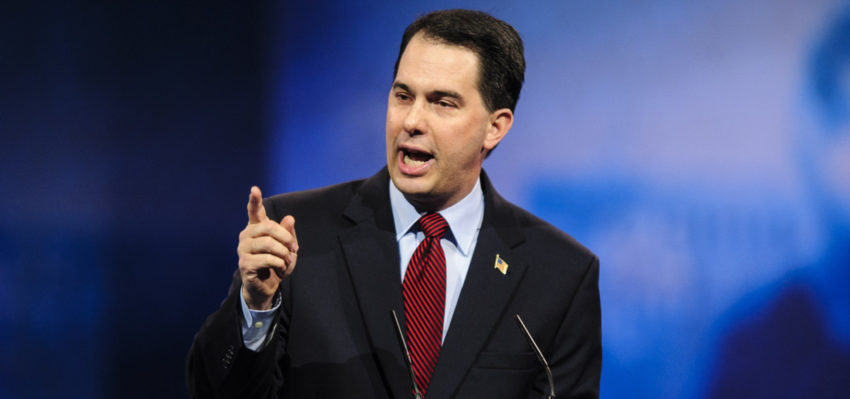 [bctt tweet=”In this week’s column, @DanODonnellShow uses the Wisconsin Recall to illustrate why impeachment would be the best possible thing to happen to President @realDonaldTrump ahead of the 2020 election.” username=”MacIverWisc”]
[bctt tweet=”In this week’s column, @DanODonnellShow uses the Wisconsin Recall to illustrate why impeachment would be the best possible thing to happen to President @realDonaldTrump ahead of the 2020 election.” username=”MacIverWisc”]
April 24, 2019
Special Guest Perspective by Dan O’Donnell
Nancy Pelosi is deathly afraid of impeachment. No, it’s not because of a sudden magnanimous surge of camaraderie. It’s because she understands what her fellow Democrats do not: Impeaching President Trump would be an unmitigated disaster.
How did Walker win his recall election? The answer is as simple as it is seemingly difficult for Democrats to grasp: The overwhelming unity Republicans experienced in the wake of that opposition.
Rank-and-file Democrats clearly believe that initiating impeachment proceedings in the Democrat-controlled House would sufficiently weaken Trump ahead of the 2020 presidential election, but they need only look to the ill-fated recall of former Wisconsin Governor Scott Walker to realize the folly of this assumption.
In early 2012, Walker seemed like (politically speaking) a dead man walking. His opponents had secured more than 900,000 signatures on a petition to recall him following his Act 10 public sector union reforms, and opposition to them brought 100,000 protestors to the Wisconsin Capitol just a year earlier.
No governor had ever survived a recall attempt, and the most recent to face one–California’s Gray Davis in 2003–was defeated overwhelmingly.
Yet stunningly, the effort to recall Walker backfired. Just a year after 100,000 protesters showed up to oppose him, he gained 200,000 votes from his 2010 election victory over the exact same opponent.
How did this happen? How did a politician so weakened by intense opposition manage to increase his margin of victory so significantly? The answer is as simple as it is seemingly difficult for Democrats to grasp: The overwhelming unity Republicans experienced in the wake of that opposition.
In other words, the hysterical overreaction to Act 10 galvanized support for Walker from both conservatives and independents who saw the effort to remove Walker for what it was–a political power play masquerading as an appeal to morality.
Walker’s commonsense calculation that overspending on public sector union benefits was bankrupting the state might not have been shared by an overwhelming majority of Wisconsinites, but the belief that Democrats overreacted to it sure was.
Voters, quite simply, couldn’t stomach removing a governor because of a disagreement on policy. In other words, Walker had already been tried in the court of public opinion and exonerated. Democrats, on the other hand, were judged to be sore losers simply bitter over their defeat in the 2010 election and the subsequent implementation of Republican legislation.
It’s almost impossible not to see the similarities in 2019. After two years, millions of dollars, tens of thousands of pages of documents, and hundreds of witnesses, Special Counsel Robert Mueller’s report found no evidence that the Trump campaign engaged in a criminal conspiracy with Russia to swing the 2016 presidential election.
Trump had won it fair and square, just as Walker had six years earlier. Democrats, though, still haven’t accepted that and are still looking for something, anything that would essentially undo the results. It is impossible to see an impeachment movement through any other lens.
Trump had won it fair and square, just as Walker had six years earlier. Democrats, though, still haven’t accepted that and are still looking for something, anything that would essentially undo the results. It is impossible to see an impeachment movement through any other lens.
Pelosi understands this, and is trying desperately to tamp down her party’s rabid push for it. She recognizes that national Democrats face the same uphill battle that Wisconsin Democrats did in 2012 of convincing the voting public that policy and/or personal differences can justify removal from office.
Republicans learned their lesson 20 years ago, when their effort to impeach President Bill Clinton resulted in his public opinion polling hitting the highest point it did during his presidency at 73 percent. Did voters decide that they liked Clinton a lot better once it was revealed that he was a lying adulterer? Of course not. They decided that he was the victim of a Republican witch hunt.
Why do Democrats think that President Trump would fare any differently? He has been claiming for years that the investigations into him were politically motivated, and in drafting Articles of Impeachment against him, Democrats would prove him right.
For years, he has claimed that the national media was out to get him. In fanning the flames of impeachment and overtly pushing for it, they are and have been proving him right for months
Politics is, at its core, making one’s opponent as unsympathetic and unlikable as possible. President Trump is beloved by his supporters, sure, but is loathed by millions. Turning him into a victim by impeaching him with no rational grounds, would turn him–like Clinton and Walker before him–into a sympathetic and therefore far more likable figure.
Not only would he survive a Senate trial since the requisite two-thirds vote to convict is an all-but-impossible standard, but he would also likely win re-election next year in a landslide on a message that amounts to little more than “Make Democrats Sane Again.”
Pelosi, therefore, has ample reason to fear impeachment, as it would solidify conservative support for a President already backed by a record-high number of Republicans and convince fair-minded Democrat-leaning voters that the opposition to Trump simply hasn’t gotten over its 2016 loss.
This is a recipe for disaster in 2020–a suddenly sympathetic president presiding over a roaring economy facing an opponent whose message amounts to little more than “Don’t you hate this guy as much as I do?”
Nancy Pelosi sees it. Here’s hoping the rest of her party doesn’t.